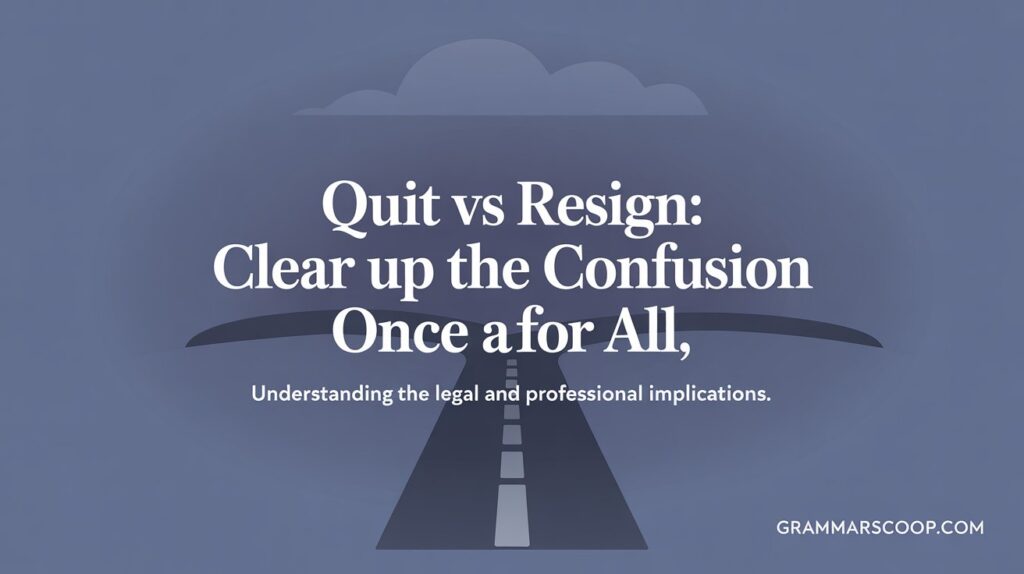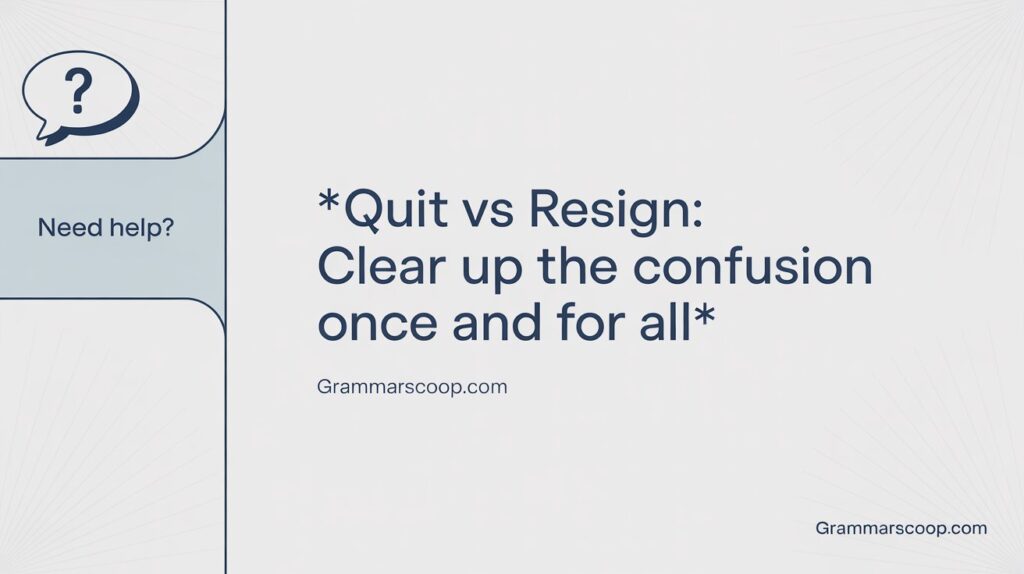Leaving a job is one of the biggest decisions a person can make. But when it comes to how we describe that action, things can get confusing fast. Did you quit your job? Or did you resign? Resign vs Quit may appear to mean the same thing, but tone, context, and professionalism make all the difference. At first glance, these two words might seem interchangeable. But there’s a difference—a big one.
“Quit” vs “Resign” may appear to mean the same thing, but tone, context, and professionalism make all the difference. In some situations, using the wrong word could come off as abrupt, unprofessional, or even disrespectful. That’s why understanding the difference between quitting and resigning is essential for anyone navigating the modern workplace.
Let’s break down the nuances of resigning vs quitting, explore their uses in grammar and culture, and finally settle the debate: what’s the difference between quitting and resigning?
Why People Get Confused
The confusion comes from two main issues:
- Both mean leaving a job voluntarily
- They’re used interchangeably in casual speech
But context matters.
- You might say, “I quit my job last week,” when chatting with a friend.
- But in a formal resignation letter, you’d never write, “I’m quitting. Bye.”
Also, the rise of informal communication styles in emails and texts has blurred the lines even more. Many workers aren’t taught the difference during onboarding or career prep.
The truth? “Quit” and “resign” aren’t identical twins. They’re more like cousins.
Quit vs Resign — What’s the Real Difference?

The difference between quitting and resigning lies in formality, tone, and sometimes consequence. Here’s a quick comparison:
| Element | Quit | Resign |
|---|---|---|
| Tone | Informal, abrupt | Formal, respectful |
| Used in | Everyday speech | Professional settings |
| Common phrase | “I quit my job” | “I resigned from my position” |
| Connotation | Emotionally charged | Deliberate, composed |
| Associated with | Walking out, sudden exits | Giving notice, writing a letter |
| Legal implication | Sometimes lacks documentation | Often involves formal procedure |
Is resigning the same as quitting? Not exactly. You quit a video game or a bad habit. You resign from a board, a position, or a job—especially in a corporate setting.
When Should You Use “Quit”?
Use “quit” when:
- The departure is informal
- You’re expressing frustration or spontaneity
- There was no formal notice given
- You’re referring to non-professional settings
Examples of Using “Quit”:
- “I quit that toxic workplace after they denied my vacation.”
- “He quit school in his senior year.”
- “She quit the team because of a conflict.”
In Real Life:
Case Study: A barista in a high-pressure coffee shop had enough of rude customers and walked out mid-shift. When asked about it, she said, “I quit.” There was no letter, no notice, just a decision made on the spot.
In short, “quit” is emotionally raw, immediate, and sometimes unplanned.
When Should You Use “Resign”?
Use “resign” when:
- The setting is formal or corporate
- You’re providing notice in writing
- The exit involves a chain of command
- You want to maintain a professional reputation
Examples of Using “Resign”:
- “I resigned from my marketing director role after five years.”
- “He submitted a resignation letter to HR.”
- “They asked the minister to resign amid the controversy.”
In Real Life:
Case Study: A CEO of a Fortune 500 company steps down after 10 years. In the press release, she states: “I have decided to resign to pursue new opportunities.” The company releases an official statement, and a transition plan is announced.
In these situations, “resign” helps preserve dignity, process, and professional relationships.
Grammar Breakdown – How “Quit and Resign” Function in Sentences

“Quit” as a Verb
- Simple present: quit/ quits
- Simple past: quit
- Present participle: quitting
Examples:
- “She quits every time things get hard.”
- “He quit smoking last year.”
- “They are quitting their positions tomorrow.”
“Resign” as a Verb
- Simple present: resign/ resigns
- Simple past: resigned
- Present participle: resigning
Examples:
- “He resigns from every project he finds boring.”
- “She resigned last Friday.”
- “They are resigning as directors next month.”
What About Adjectives? Do “Quit” or “Resign” Work That Way?
Technically, neither “quit” nor “resign” are used as adjectives on their own. But their derivative forms are.
Quit – Derived Usage
- Quitting: Can describe behavior (“a quitting attitude”)
- Quitter: Noun, often derogatory
Resign – Derived Usage
- Resigned: Can be an adjective meaning accepting something unpleasant without resistance
- Example: “He gave a resigned sigh.”
These forms carry different meanings, so be careful not to misuse them in place of the verbs themselves.
Explore further:
- Feel Or Feal: Don’t Mix Up These Similar Words
- Up to Date or Up-to-Date: Which One Should You Use?
- Arised or Arose: to the Correct Past Tense of Arise
- Acclimate vs. Acclimatize vs. Acclimatise: Guide to Proper Usage
- excel vs accel: What Is the Correct Spelling?
Common Mistakes (And How to Avoid Them)
Avoiding these missteps will improve your communication:
- Saying “I resigned from college” — it should be “I quit college”
- Writing “I quit my role as CFO” in a formal resignation — it should be “I resigned from my role as CFO”
- Mixing past and present forms: e.g., “I had quitted” is incorrect (the past participle of “quit” is still “quit”)
Quick Tips:
- Use “quit” for casual, sudden exits
- Use “resign” for formal, professional communication
Powerful Synonyms to Replace “Quit” and “Resign” (And When to Use Them)
Alternatives to “Quit”
- Drop out: For school or programs
- Walk away: Emphasizes emotional distance
- Abandon: Slightly negative tone
- Exit: Neutral, sometimes used in corporate settings
- Give up: Implies surrender or defeat
Alternatives to “Resign”
- Step down: Common in leadership roles
- Retire: Usually based on age or years of service
- Vacate: Legal or contractual tone
- Bow out: Gentle, graceful exit
- Withdraw: Neutral, often used in nominations or candidacy
Choose wisely based on tone and audience.
Etymology – Where Did These Words Come From?
Origins of “Quit”
- From Latin “quietus” meaning “free, at rest”
- Passed through Old French as “quiter”
- Originally meant to be released or absolved of something
Origins of “Resign”
- From Latin “resignare” meaning “to unseal, give back”
- Middle English: “resignen”
- Initially used in legal and royal contexts, like resigning a title
These roots explain why “resign” sounds more formal. It comes from legal and noble usage, while “quit” feels more casual and personal.
Cultural and International Usage
Language usage varies globally.
- In the U.S., “quit” is commonly used in speech, while “resign” appears in HR and legal documents.
- In the UK, “resign” is used more consistently across all professional settings.
- In many Asian cultures, where hierarchy matters, “resign” is preferred to maintain formality.
In multilingual companies, choosing “resign” avoids confusion or unintended disrespect.
Real-Life Examples That Show the Difference
| Situation | Correct Term | Why |
|---|---|---|
| A part-time waiter walks out mid-shift | Quit | Sudden, informal |
| CFO submits a formal two-week notice | Resign | Professional setting |
| High school student leaves school early | Quit | Educational, not corporate |
| Mayor steps down amid controversy | Resign | Public office, needs formality |
Quick Comparison Table – “Quit” vs “Resign”
| Feature | Quit | Resign |
|---|---|---|
| Context | Informal, emotional | Formal, professional |
| Common Phrase | “Quit my job” | “Resigned from my position” |
| Legal Documentation | Often lacking | Usually documented |
| Tone | Casual, blunt | Polished, neutral |
| Appropriate For | Friends, social conversations | HR, official announcements |
Conclusion – Say It Right, Leave Right
So, resigning vs quitting isn’t just a grammar nerd debate. It’s about how you carry yourself, how you exit, and how you’re remembered. Use “quit” when you’re being honest and casual. Use “resign” when you’re being respectful and professional.
What’s the difference between quitting and resigning?
It boils down to this:
- Quitting is impulsive.
- Resigning is intentional.

Lisa Morris is a seasoned blogger and language enthusiast with a passion for making grammar simple and engaging. At Grammar Scoop, she shares clear, concise tips that help readers master the rules of English with confidence.






